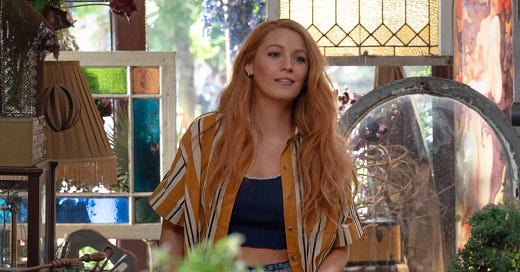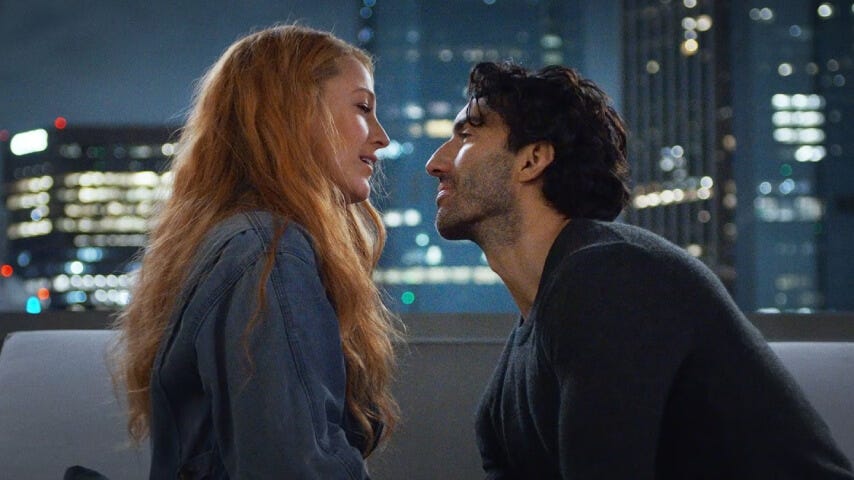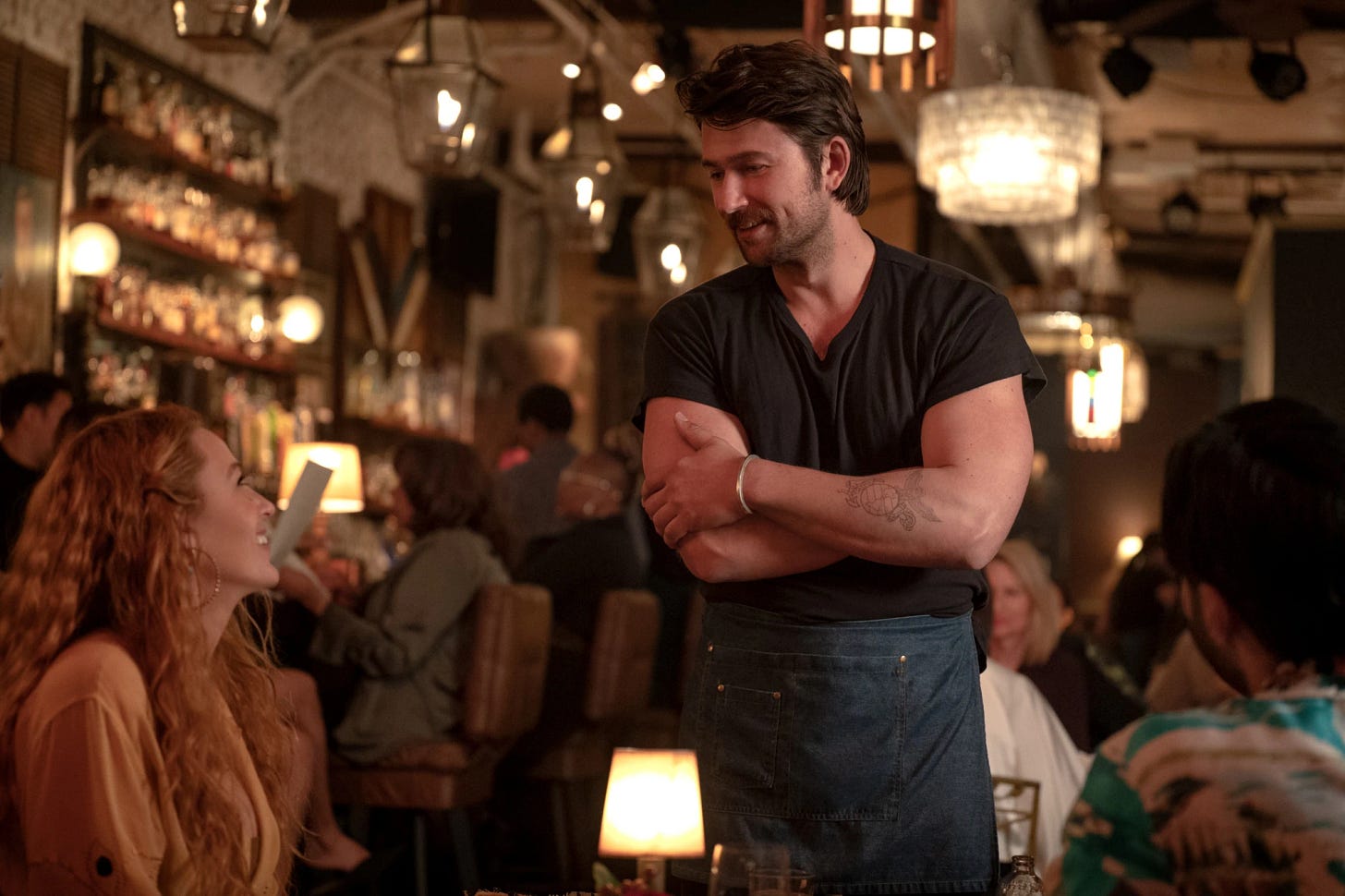‘It Ends With Us’ blossoms in its smallest moments
Blake Lively leads the highly anticipated adaption of Colleen Hoover’s bestseller
Welcome to Girl Culture, the newsletter where Caroline Siede examines pop culture, feminism, and more. You can learn about Girl Culture’s mission here and support it here.
When people talk about movies that “need to be seen in a theater,” they usually mean big action blockbusters that take advantage of the massive screen and surround sound intensity. But I actually think it’s intimate dramas that benefit the most from the big screen experience. Without the distraction of a second screen or the temptation to pause for a quick snack break, it’s much easier to lock into the rhythms and tensions that make or break a smaller-scale human story. And that’s very much the experience I had with Blake Lively’s new romantic drama It Ends With Us, which swept me up in a theatrical viewing in a way I’m not sure it would have if I had seen it at home.
It Ends With Us has the same sort of dreamy, observational quality I felt in director Justin Baldoni’s debut feature, Five Feet Apart—a movie I didn’t give a totally glowing review to at the time, but which has stuck with me far more than most teen dramas of its ilk. Baldoni clearly directs from a very actor-centric point of view, which makes sense given that he’s an actor himself—not only in It Ends With Us but also as Rafael Solano on Jane The Virgin. And his interest in the nuances of human behavior lends an elevated quality to a film that could’ve easily been bogged down in pure melodrama.
Take, for instance, the scene where improbably name florist Lily Blossom Bloom (Lively) first meets Baldoni’s brooding neurosurgeon, Ryle Kincaid. They’re each coming off very bad days and find themselves flirting on a rooftop as only two hot, semi-depressive strangers can. At one point, she makes a joke that he must actually be an escort and he mentions never kissing on the mouth. And because I watch a lot of movies in this broad “girl culture” category, I can tell you that 99.9% of them would have had Lily respond with some variation of “Pretty Woman! I love that movie!”
In It Ends With Us, however, Baldoni’s camera just lingers on Lily’s face as she clocks the reference, thinks about acknowledging it, and then moves on with a newfound appreciation for the layers of the man she’s flirting with. It’s a great performance moment from Lively, a fantastic screenwriting impulse from Christy Hall, and—most of all—a sharp directorial choice from Baldoni.
All of that adds up to a film that lives and dies in its details more than its big plot moves. Based on Colleen Hoover’s much buzzed about, bestselling novel of the same name, It Ends With Us is a sort of Nicholas Sparks-adjacent story about love triangles and family traumas. While the book marketed itself as a romance and the film’s trailer gives away far more of the twisty plot, I think it’s easiest to say that It Ends With Us is a self-actualization story for a woman in her 30s who’s still haunted by the domestic abuse she witnessed in her house growing up. As Lily puts the past behind her and finally fulfills her lifelong dream of opening a boutique flower shop, she finds herself caught between perfect-on-paper Ryle and Atlas Corrigan (Brandon Sklenar), the lost-teenage-love-turned-professional-chef who knows exactly what she’s been through in the past.
Again, however, the ridiculous names, cheesy professions, and somewhat absurd costuming (it’s somehow always both 50 degrees and 75 degrees in Boston, I guess) don’t really reflect the more nuanced emotional wavelength the movie is operating on. The scene where Lily and Atlas first bump into each other as adults genuinely made me cry—not because anything particularly emotional happens, but just because Lively and Sklenar are so good at capturing the flustered, excited, sad feeling of running into someone you used to be close with and desperately trying to smooth over the awkwardness with small talk even though there are so many deeper things you want to say.
Lively’s specialty has always been blending aspirational glamour with relatable everywoman charisma, and that’s used to great effect here. Lily is independent and luminous and clever in the way we want our romantic leading ladies to be. So when her life begins to spiral beyond the usual problems that romantic leading ladies in movies like these have to deal with, the fall feels harsher; the sense of “this could happen to anyone” more palpable. It Ends With Us takes an intentionally sharp turn for the dramatic in its second half, but the shift works because the movie understands that when you’re in a whirlwind relationship, sexy intimacy and unsettling codependency can sometimes feel the same until it’s too late.
Working largely in close-up, Baldoni visually locks us into Lily’s emotional journey in a way that’s far more effective than any of the film’s more on-the-nose dialogue about domestic abuse. We experience jolts of violence as Lily experiences them: Brief, disorienting blips she tries to intellectualize away or startling flashes of memory that wash over her unexpectedly. When she plasters on a smile, we understand it’s both an act of self-delusion and also, more importantly, one of self-preservation.
Unfortunately, all that small-scale attention leaves It Ends With Us with a pretty big blindspot when it comes to exploring the actual systems that enable cycles of abuse. This isn’t the sort of film that’s interested in financial disparities or legal system biases or the impossible choices that women like Lily’s mother must make when it comes to co-parenting with their abusers. As such, it’s really only telling half a story—earnest as it may be in its intentions.
As a cultural statement, It Ends With Us doesn’t quite get there, and that’s a shame given that it clearly has aspirations of being a “message movie.” As a personal exploration of what it feels like to be caught up in a cycle of violence, however, it’s a much more powerful big-screen experience. One that shines brightest in its smallest moments.
Other stuff I’ve worked on lately: I weighed in on the final season of The Umbrella Academy for Episodic Medium.
Some Hollywood gossip: I didn’t feel any of this tension in the movie itself, but apparently there could be some IRL friction between Baldoni and Lively—who are doing their press cycles almost entirely independently of one another. I’ll be fascinated to see if we ever get any more details about that or if it’ll remain a Hollywood mystery.






